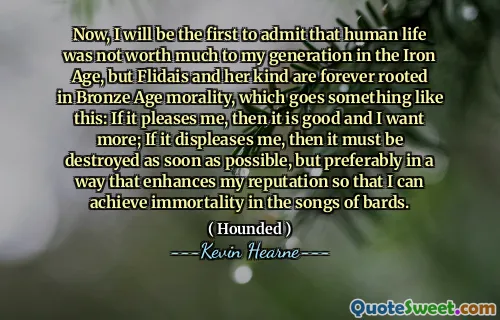
Now, I will be the first to admit that human life was not worth much to my generation in the Iron Age, but Flidais and her kind are forever rooted in Bronze Age morality, which goes something like this: If it pleases me, then it is good and I want more; If it displeases me, then it must be destroyed as soon as possible, but preferably in a way that enhances my reputation so that I can achieve immortality in the songs of bards.
This quote offers a thought-provoking reflection on how morality and values can vary significantly across different eras and cultures. The speaker juxtaposes the ruthless, self-centered morality of the Bronze Age—characterized by a desire for personal pleasure and reputation—with the more nuanced or perhaps more humane perspectives that may have emerged over time. It highlights the idea that certain moral frameworks prioritize individual gratification and social recognition above all else, often leading to destructive or domineering behaviors to attain permanence and memory in history or legend. The reference to Flidais, a goddess from Irish mythology associated with nature and possibly fertility, imbues the quote with a touch of ancient spirituality, reminding us that moral standards are sometimes rooted deeply in cultural narratives, gods, and mythos. Moreover, the irony of claiming importance in songs and stories underscores a universal human desire for legacy—wishing to be remembered, even if it demands selfish or destructive actions. Such reflections serve as a reminder that our contemporary morals may be more complex, emphasizing compassion, empathy, and collective well-being, yet they also invite us to consider the roots of human behavior and whether certain impulses are ingrained or influenced by cultural tales passed down through centuries. This quote challenges us to examine our own values and how they shape our actions, especially in a society that frequently values fame and reputation above all.







